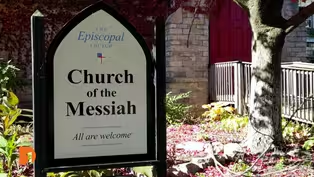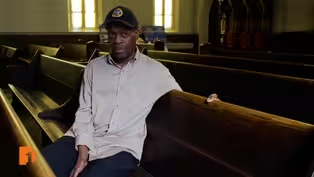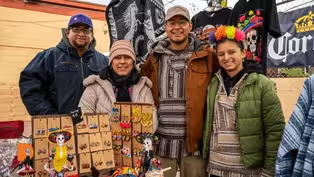
Lily and Jim: Kapwa, Tampo and eating like a Filipino
Clip: Season 9 Episode 18 | 3m 55sVideo has Closed Captions
Lily Mendoza and Jim Perkinson discuss their cultural differences as a married couple.
Since getting married in 2004, Lily Mendoza and Jim Perkinson have built a rich and full life together as activists and educators. For Filipino American History Month, we revisit their conversation where they talk about how they've navigated the differences between their cultures and what they're still learning. This conversation is part of One Detroit’s ongoing AAPI Story Series.
Problems playing video? | Closed Captioning Feedback
Problems playing video? | Closed Captioning Feedback
One Detroit is a local public television program presented by Detroit PBS

Lily and Jim: Kapwa, Tampo and eating like a Filipino
Clip: Season 9 Episode 18 | 3m 55sVideo has Closed Captions
Since getting married in 2004, Lily Mendoza and Jim Perkinson have built a rich and full life together as activists and educators. For Filipino American History Month, we revisit their conversation where they talk about how they've navigated the differences between their cultures and what they're still learning. This conversation is part of One Detroit’s ongoing AAPI Story Series.
Problems playing video? | Closed Captioning Feedback
How to Watch One Detroit
One Detroit is available to stream on pbs.org and the free PBS App, available on iPhone, Apple TV, Android TV, Android smartphones, Amazon Fire TV, Amazon Fire Tablet, Roku, Samsung Smart TV, and Vizio.
Providing Support for PBS.org
Learn Moreabout PBS online sponsorship(pensive music) - Yeah, so very quickly, what I had to learn was about the cultural difference between my whiteness and being run through the inner city and your Filipinoness.
And so you... - And we have this core value among our Indigenous cultures in the Philippines that's called kapwa, which is shared being, the other as part of oneself, too.
And so it comes with a whole complex of communication dynamic, right?
That is not this individualistic thing.
And a lot of it carries an indirection or requires an indirection sensing.
- What I remember is early on, you, one night, asking me, "Babe, what do you want to do?"
And I told you, I don't remember what I told you, but something like I said, "Ah, let's get a pizza and go see a movie."
And you were kind of put off by that.
And only slowly did I learn, as you educated me, that what you really were inviting was for me to very obliquely indicate what maybe I might like to do, and then you would do the same, and then we would go back and forth in a dance that was delicate and exquisite.
And arriving at the decision was every bit as important as what we actually decided to do because it was just a living out of the quality of the relationship and that kind of non-verbal, or very indirectly, verbal sensitivity and knowing of each other.
So, I'm still learning that.
- Yeah, and for my part, I also had to learn a different way, especially when it came to our conflicts, right?
Well, we have this other cultural thing that we call tampo.
It's a delicate feeling of hurt where you withdraw and you expect the other person to read you and to know.
- Yeah, that was something else I had to learn about.
- Yeah, and I would get so frustrated because you couldn't sense me, right?
And we had to work it so I would also learn to speak my heart.
- Yeah, very much a back and forth, where in any given situation, whose cultural assumptions and habits we're going to be honored, and who was going to adapt to whom.
And that's part of the synergy of, I guess, any relationship.
But it was a deep kind of thing that we had to learn and still are learning with each other.
- The other thing that we had to negotiate was the protocol around food.
You were frustrated being in the Philippines because we were getting fed- - Yeah, the first time there.
- Every single house that we visited, they would put a spread.
- So, yeah.
I had like six meals in four hours.
I just didn't- - I said, "Rather than getting frustrated, you have to understand that food is a language in my culture, as most Indigenous cultures also."
Church of the Messiah Detroit celebrates 150th anniversary
Video has Closed Captions
Clip: S9 Ep18 | 3m 17s | The Church of the Messiah marks 150 years of service and community building in Detroit. (3m 17s)
Church of the Messiah marks 150 years of community service
Video has Closed Captions
Clip: S9 Ep18 | 5m 26s | Church of the Messiah Pastor Barry Randolph reflects on the church’s 150th anniversary (5m 26s)
Contributors discuss races to watch in the 2024 election
Video has Closed Captions
Clip: S9 Ep18 | 7m 24s | One Detroit political contributors discuss the races to watch ahead of the 2024 election. (7m 24s)
Things to do in Detroit this weekend: November 1, 2024
Video has Closed Captions
Clip: S9 Ep18 | 1m 57s | Dave Wagner and Cecelia Sharpe of 90.9 WRCJ share some events coming up this weekend. (1m 57s)
Providing Support for PBS.org
Learn Moreabout PBS online sponsorshipSupport for PBS provided by:
One Detroit is a local public television program presented by Detroit PBS















